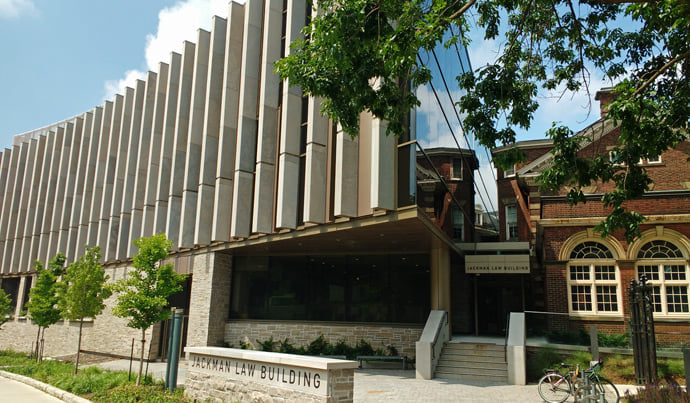A controversial scholar, whose work has been critical of Israel, is getting a second shot at a job with the University of Toronto law school, a development that’s making Jewish organizations nervous.
In a press release issued June 7, Jutta Brunnée, the new dean of the law school, announced she is resuming the search for a director of the International Human Rights Program, and this time she will chair the search committee herself.
Tellingly, the release added the search last year identified a “preferred candidate” and Brunnée hopes the process can be completed quickly with a focus on complying with immigration and work visa requirements.
Brunnée confirmed to the CBC the “preferred candidate” is the same applicant from last year. She added she has reached out to Valentina Azarova to let her know the application is open.
The search for a new director carried out last year ended with Azarova as the unanimous choice of the committee.
Negotiations on a formal job offer, however, were suddenly ended last September with the university citing immigration issues that would keep Azarova from taking up the position in the time frame the school required.
Now, however, with a professor emerita serving as interim director of the program, the law school “can take the time needed to resolve the issue of work authorization and any immigration issues, in accordance with due process and law.”
In the new search the law school said the qualifications of Canadian scholars interested in the position will be assessed “should any emerge.”
“In the interests of the Faculty and our broader community, we will be moving forward expeditiously, including complying with any required immigration or Canadian work authorization process,” Brunnée, said in the news release. “We look forward to filling this role. The IHRP is a key part of our international and experiential offerings and students greatly value the opportunities it provides.”
By law, the university said it is required to post advertisements for four consecutive weeks to solicit candidates.
Azarova’s supporters have rejected the university’s claim that immigration issues kept her from the job. They allege instead that a wealthy donor and alumnus voiced concerns about her academic history, warning that hiring her could harm the school’s reputation.
A review of the controversy by retired Supreme Court of Canada Justice Thomas Cromwell concluded there was no outside interference in the hiring, but some university policies had been breached.
The donor in question, Justice David Spiro of the Tax Court of Canada, was also investigated by the Canadian Judicial Council. Its report concluded he made serious mistakes, but they did not warrant removing him from the bench.
The wording of the university release, law school faculty members told CBC News, is a clear indication the job is Azarova’s if she still wants it.
“I think the message is pretty clear that Dr. Azarova, should she apply, will be hired,” professor of law and philosophy David Dyzenhaus told the CBC.
That outcome, he added, will help to heal wounds in the faculty.
Offering Azarova the director’s chair is also the outcome sought by the Canadian Association of University Teachers, which recently passed a motion of censure against UofT. Censure discourages CAUT members from accepting appointments or speaking engagements at the school and has already led to the cancellation of speakers including former Governor-General Michaelle Jean.
CAUT has said the censure will not be lifted until Azarova is given the job. That position was reiterated in a statement to The CJN by the association’s executive director David Robinson.
“The University of Toronto’s announcement that it is resuming its search for a director of the International Human Rights Program and that Dr. Azarova is still the preferred candidate is welcome if it is in good faith. We still have concerns that actions taken to date are inadequate to address the concerns that gave rise to the Canadian Association of University Teachers’ censure of the administration,” he wrote.
“A search process has already been conducted that, following a review of 160 applicants, unanimously selected Dr. Azarova. As we have already pointed out on numerous occasions, there are multiple routes the University could have pursued to satisfy immigration requirements to secure Dr. Azarova’s work permit. Re-offering the job to Dr. Azarova in good faith is necessary for resolving the matter.”
James Turk, of Ryerson University’s Centre for Free of Expression, also feels “the only remedy here is for them to offer the job to Azarova.”
Turk, a former executive director of CAUT, said censure of a university is an extremely rare event in Canada—there has only been one other case since 1979—and when it is threatened, the schools usually change their behaviour within weeks.
“In this case UofT did not change its position,” he said. “CAUT’s goal here is not to rub their noses in it, CAUT’s goal is to fix the problem.”
“Right now, this is (Azarova’s) job to accept or reject,” he added. “The university’s release is pretty vague, but it seems like a good sign insofar as it goes.”
B’nai Brith Canada has said that hiring someone with Azarova’s long history of criticizing Israel would make the law school environment uncomfortable for Jewish faculty and students.
“B’nai Brith believes that Ms. Azarova continues to be a poor choice for the role, given her obsessive focus on Israel and work for questionable organizations,” B’nai Brith CEO Michael Mostyn said in a statement, adding “Certainly, UofT should not be seen to pre-judge the outcome of the resumed hiring process.”
Hillel Ontario declined to comment directly on the hiring of Azarova. “Our primary objective is to ensure Jewish students are able to study on campus free from antisemitism, discrimination and harassment. That said, Hillel is not involved in university hiring decisions,” Jay Solomon, chief communications and public affairs officer for the organization, said in a statement.
